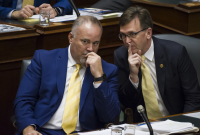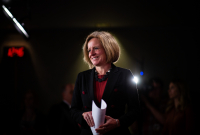Support strong Canadian climate journalism for 2025
Two men representing opposite ends of the country are set to become central figures in the story of Canada's approach to the climate crisis, with Jonathan Wilkinson taking over the environment file and Seamus O'Regan moving into the natural resources portfolio.
Prime Minister Justin Trudeau is set to shake-up the federal cabinet in the afternoon of Nov. 20 at Rideau Hall, in advance of his minority government leading a new Parliament next month. But already, word of the shuffle is leaking out, and it appears to be larger than expected, according to reports in The Canadian Press, CBC News and CTV News.
Wilkinson, who represents North Vancouver in British Columbia, is moving into the environment and climate change role at a time of deep regional divisions over the federal carbon pricing system, the clean fuel standard, methane regulations and other Trudeau green policies.
But he is no stranger to the portfolio; before his current role as fisheries minister, he was a parliamentary secretary to the minister of environment, and in fisheries he has promoted one of the government’s central environmental strategies, the Oceans Protection Plan. Wilkinson was also a key figure at the G7 environment ministers’ meeting in Halifax in 2018.

O'Regan, who represents St. John's South—Mount Pearl in the oil-producing province of Newfoundland and Labrador, is moving from Indigenous Services to take over the energy file, after the Trudeau government’s previous natural resources minister Amarjeet Sohi lost his seat in the fall federal election.
Meanwhile, Bernadette Jordan, who was brought in this January to cabinet as minister for rural economic development, will pick up the fisheries file from Wilkinson.
Catherine McKenna moving to infrastructure file
Wilkinson takes over from Catherine McKenna, who will be leaving the environment file she has commanded since 2015, and moving to infrastructure and communities.
McKenna is expected to emphasize some work she has already been doing on environmentally-friendly infrastructure and climate change mitigation. During the Trudeau government’s first term it promised tens of billions of dollars for green infrastructure projects in public transit, energy efficiency and other areas.
François-Philippe Champagne, who previously held the role of infrastructure minister, will become Canada’s new foreign affairs minister. Canada’s current top diplomat, Chrystia Freeland, will be handed the role of deputy prime minister and minister in charge of domestic affairs.
In her new role, Freeland will be thrust onto the front lines of the battle between the Liberal federal government and conservative-led provinces such as Alberta and Saskatchewan, where the Liberals failed to win any seats, and Tory-run Ontario where Premier Doug Ford has been a thorn in the side of Trudeau over the carbon tax.
Cabinets usually attempt to balance the country’s regional representation, a difficult task for the Liberals given the election result. Freeland, who represents a Toronto riding, has Alberta roots, while Wilkinson grew up in Saskatchewan.
Former Quebec environmental activist Steven Guilbeault will be given the Canadian Heritage file, currently held by Pablo Rodriguez, who will be moving to House leader, the person who makes sure government legislation passes. In this minority government, that means securing the votes of at least 13 members of the opposition.






Comments
So, the new Canadian Environment Minister
used to be CEO of a "clean gas" company that had contracts with Exxon and Shell
Teresa McGee
@TMcGee2
·
3h
Replying to
@bronwentucker
and
@JonathanWNV
My personal conversation with @jonathanwilkinson revealed that he believes we can properly clean up a diluted bitumen spill and that transport of dil-bit by tanker is totally safe. He is firmly in the pocket of big oil and gas. #cdnpoli
Burnaby, BC, December 22, 2004
https://www.bctechnology.com/news/2004/12/22/QuestAir-Technologies-Inc…
Ugh.....Navdeep Bains is still the Minister of Innovation, Science and Industry . So....nothing will continue to happen. & there you have it.
Bernadette Jordan: Minister of Fisheries and Oceans and Canadian Coast Guard ! YAY !